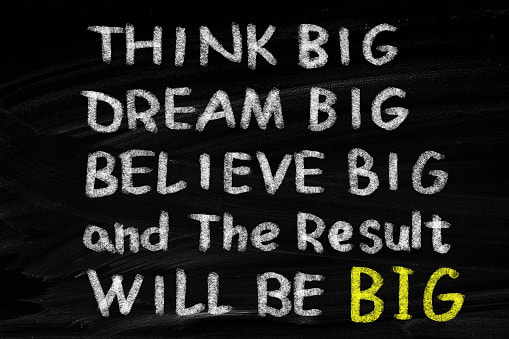|
I feel like this time around graduation for so many is one of those periods of time that this bit of irony comes up for me. We tell our graduates to dream big! Martin Luther King, Jr. wrote his "I Have a Dream" speech that gets quoted quite often (and I'm praying it will someday be lived out by all the world). Even in "This is Us", Rebecca tells her three grown children (as she is dealing with the onset of dementia) to not make their lives smaller because of her. She tells them she wants them to take risks and make the big moves, despite what health complications she has. In other words, she wants them to dream big! It's a pretty emotional scene, and I hope I didn't do the dreaded spoiler for those of you who haven't gotten to that part, yet (I am, of course, assuming you are all watching it----if you aren't, I'm not sure there is hope for you in the first place----just kidding!).
But weren't some of us also told, as children, to quit daydreaming and get back to work? Oh wait, maybe that was just me. Charlotte Danielson (personal communication, 2017) talked to her Danielson consultants at a training about how we should caution administrators observing teachers to not "assume" a student is not "cognitively engaged" in a lesson being taught just because the student might be staring out the window. In fact, "staring out the window students" are often the most engaged, as they are possibly trying to process and figure out what they want to write next on their writing assignment or what strategy to use as they begin to tackle the next math problem. So, is daydreaming really a bad thing? Maybe, in some cases, if it keeps us immobilized from getting up and getting into action. We all know the sayings: "The road to hell is paved with good intentions" or "Small deeds done are better than great deeds planned", etc. (I'd love to hear more of yours), but the fact remains that our graduates (and maybe all of us) need to remember that sometimes a really great action starts with a dream. When I was getting my master's degree in counseling, we talked about the psychology of dreams a bit. I wish we could have studied it for a whole course, to be quite honest, as I have always been a lover of the meaning of dreams. I analyze my own, and I love to help others analyze them (Dave might say "...whether they like it or not"). If Dave tells me a dream he had the night before, I often say, "Oh, well the train part came in because we were talking about taking a train vacation yesterday". I can almost always point to the thoughts (fleeting as they may have been) that led up to at least the impetus for a dream. And I do have certain beliefs about recurring types of dreams. For instance, every once in a while, I have a dream in which I am driving way too fast and I drive off a cliff. The dream always wakes me up, as I never have "landed" wherever that might have been, going off that cliff. But I can look at that dream and say to myself, "You have WAY too much on your plate right now, and you feel like things are out of control." That makes perfect sense to me. I think dreams can also be God-winks, as well. If I have a dream that my mother (who passed away in 2005) is still alive, and we are holding hands walking through a garden or nature trail ("This is Us" spoiler alert: this week's episode had me crying like a baby when Kate took Rebecca for a walk), I know there is something that I am wishing I could talk to her about or I'm wishing she were still around to be my biggest fan (she believed in my abilities WAY before I ever dreamed them----she actually told me (when I became a principal) that she always knew that I would wind up in a leadership role like that). I, on the other hand, had absolutely no idea that would ever happen. She didn't live long enough to see me get my doctorate, become a professor, publish articles and four books, or become an international educational consultant....which sometimes makes me sad....but when I see the stunningly vibrant red cardinals out on our oak tree in the backyard of our new house, I have a sneaking suspicion she is aware of the accomplishments she always believed I could or would achieve. What are your own dreams? How do they impact your decisions? Do you get caught up in daydreaming? Do you get cross with your children or students who are daydreamers and wonder if they will ever get into action? Does someone feel that way about you? What are the implications of being a dreamer, for you? I'd love to hear your thoughts about this topic! In the meantime, dream big....then go out and make it happen. Happy Communicating! Shelly
0 Comments
Leave a Reply. |
Shelly ArnesonCategories |



 RSS Feed
RSS Feed